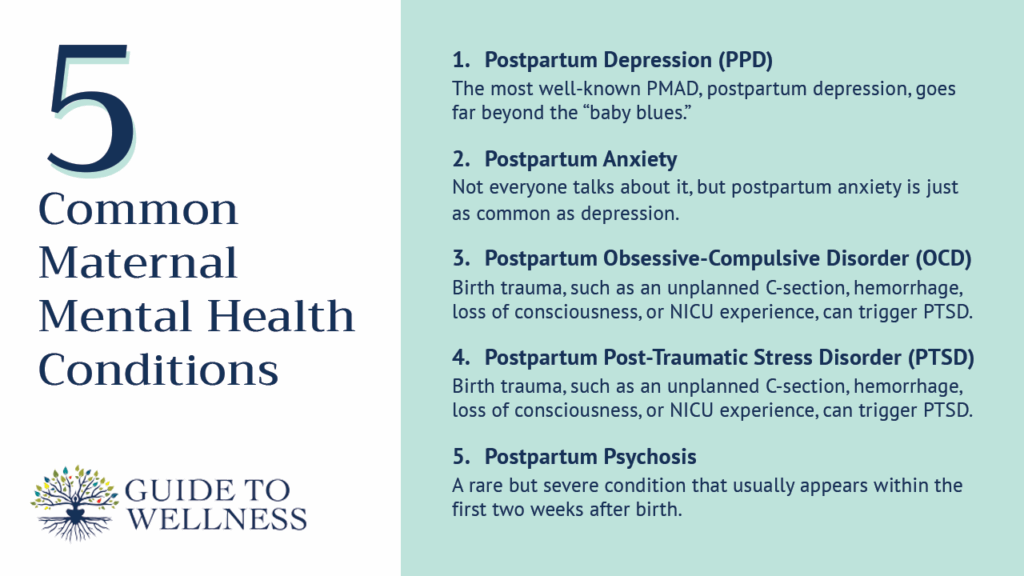Motherhood brings joy, love, and life-changing milestones, but it also brings challenges that often go unspoken. From pregnancy to the postpartum period, many mothers experience an emotional rollercoaster that impacts their mental well-being. And while some mood shifts are expected, others may signal maternal mental health conditions that deserve professional treatment and support.
At Guide to Wellness, we believe it’s time to break the stigma around maternal mental health and offer the compassionate care that mothers, birthing people, and families deserve.
Start your healing journey at Guide to Wellness now. Because you matter, just as much as your baby does.
What Is Maternal Mental Health?
Maternal mental health refers to a woman’s emotional, psychological, and social well-being during pregnancy, postpartum, and early parenting. When issues arise, this can include a range of conditions known as Perinatal Mood and Anxiety Disorders (PMADs), which can surface anytime during pregnancy or within the first year after childbirth.
These aren’t signs of weakness or poor parenting—they’re medical conditions that affect millions of mothers every year. And with the right treatment, healing is not only possible, it’s absolutely within reach.
The Emotional Rollercoaster of Motherhood
Tears, mood swings, exhaustion—it’s not just “baby blues.” Up to 1 in 5 pregnant women and new mothers experience maternal mental health conditions like postpartum depression, anxiety disorders, or obsessive-compulsive disorder. These are more than just tough days; they’re real, treatable mental health conditions that can impact daily life, relationships, and bonding with your baby.
Unfortunately, many of these symptoms go unrecognized or left untreated. That’s why it’s crucial to understand the difference between expected hormonal changes and signs of something more serious. Symptoms like persistent sadness, intrusive thoughts, difficulty bonding, or withdrawing from others may indicate clinical depression, perinatal depression, or postnatal depression. Some mothers may even experience postpartum psychosis or post-traumatic stress disorder following childbirth or a birth trauma.
Beyond the Baby Blues: 5 Common Maternal Mental Health Conditions
Understanding the different types of maternal mental health disorders can help you or someone you love get the support they need.
-
Postpartum Depression (PPD)
The most well-known PMAD, postpartum depression, goes far beyond the “baby blues.” Postpartum depression (PPD) is more serious and longer-lasting than baby blues, which usually resolve within two weeks after birth. It includes persistent feelings of sadness, hopelessness, irritability, or guilt, often accompanied by difficulty bonding with the baby or losing interest in activities you once enjoyed.
Symptoms may include:
- Crying more than usual
- Feeling disconnected from your baby
- Withdrawing from family or friends
- Trouble sleeping—even when the baby sleeps
- Thoughts of harming yourself or feeling like your family would be better off without you
-
Postpartum Anxiety
Not everyone talks about it, but postpartum anxiety is just as common as depression. Moms may feel excessive worry, racing thoughts, or physical symptoms like rapid heartbeat and dizziness.
Signs include:
- Constant fear that something bad will happen to your baby
- Trouble relaxing or sitting still
- Obsessively checking on the baby
- Panic attacks or shortness of breath
-
Postpartum Obsessive-Compulsive Disorder (OCD)
This condition involves unwanted, intrusive thoughts—usually about harm coming to the baby—followed by compulsive actions to prevent that harm (like checking locks or cleaning excessively). These thoughts can be terrifying, but they don’t mean a parent will act on them.
-
Postpartum Post-Traumatic Stress Disorder (PTSD)
Birth trauma, such as an unplanned C-section, hemorrhage, loss of consciousness, or NICU experience, can trigger PTSD. Flashbacks, nightmares, and intense fear are common symptoms.
-
Postpartum Psychosis
A rare but severe condition that usually appears within the first two weeks after birth. Postpartum psychosis includes hallucinations, delusions, confusion, and erratic behavior and is a medical emergency requiring immediate treatment.
Many of these conditions are underdiagnosed because moms are expected to “bounce back” or focus solely on the baby. But your health is just as important. If you’re not okay, it’s okay to ask for help.
What Contributes to Maternal Mental Health Issues?
Many factors can influence a woman’s mental health before, during, and after pregnancy, including:
- Hormonal changes (dramatic shifts in estrogen and progesterone)
- Sleep deprivation
- Lack of social support
- Traumatic birth or medical complications
- Prior history of mental illness
- Financial strain or food insecurity
- Relationship stress or domestic violence
- Identity shifts or loss of career autonomy
The weight of all these stressors, combined with societal pressure to be the “perfect mom,” can create the perfect storm for emotional burnout.
The Mental Load of Motherhood: What People Don’t See
Motherhood isn’t just physical—it’s mental. Keeping track of pediatrician appointments, remembering snack day for daycare, worrying about screen time, managing household tasks—it all adds up.
This unseen burden is often called “the mental load.” Moms are often the default parent, the household manager, the emotional support system, and more. Even with a supportive partner, many women still feel like they have to carry it all.
It’s no wonder so many moms report feeling exhausted, anxious, and emotionally drained. And when you’re already running on empty, making time for your own care can feel impossible.
That’s where telehealth comes in.
How Telehealth Therapy Helps Moms Prioritize Their Mental Health
Getting help shouldn’t mean rearranging your life or sacrificing what little time you have. Telehealth therapy brings care to you—on your schedule.
At Guide to Wellness, we offer secure, virtual therapy sessions that are flexible, private, and designed to meet you wherever you are, whether it’s during nap time, after the kids are in bed, or on your lunch break.
Here’s how telehealth works for busy moms:
- Flexible Appointments: No commute, no waiting room. Schedule therapy at a time that suits you, even on weekends or evenings.
- Real-Life Support: Talk to a licensed therapist who understands the challenges of parenting and can help you manage anxiety, depression, guilt, or burnout.
- Safe, Confidential Space: Speak openly from the comfort of home, even if you’re multitasking during a feeding or stroller walk.
- Covered by Insurance: We accept many insurance plans and help you navigate your options for affordable care.
Whether you’re a working mom, stay-at-home parent, single mother, or new caregiver navigating it all for the first time, you deserve support that fits your life.
Taking the First Step Without Missing a Beat
Motherhood doesn’t come with a manual. But you don’t have to go through it alone.
Therapy can help you:
- Feel less overwhelmed and more grounded
- Navigate identity changes and role shifts
- Set boundaries and ask for help
- Reconnect with yourself outside of motherhood
With online therapy, help is just a click away, and you don’t need to change out of your pajamas to get it.
When to Seek Help: Signs It’s More Than Just “Mom Guilt”
You don’t have to hit rock bottom to benefit from mental health care. If you’re wondering whether your feelings are “normal” or something more, here are some signs you might need support:
- You feel numb or emotionally detached
- You’re having frequent intrusive thoughts
- You’re unable to sleep or eat regularly
- You feel like you’re failing as a parent
- You’re avoiding your baby or dreading time alone with them
- You feel rage or irritability that feels hard to control
- You think about running away or not waking up
These are not signs of being a “bad mom.” They are red flags that you may be experiencing a treatable maternal mental health condition.
You’re Not Alone And You Don’t Have to “Tough It Out”
If you’re feeling off, we’re here to remind you: your feelings are valid, and your wellness matters.
At Guide to Wellness, we’re proud to support moms at every stage of their journey. Whether you’re dealing with postpartum depression, anxiety, or simply need someone to talk to, our licensed therapists are here to help, with care that fits into your life, not the other way around.
Start feeling better—without putting yourself last. Reach out to Guide to Wellness today and connect with compassionate, high-quality telehealth care that meets you where you are.






